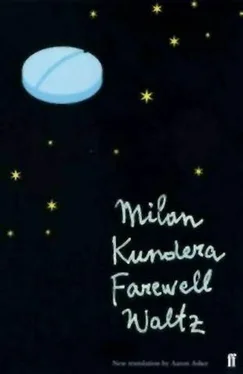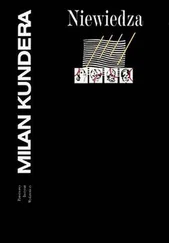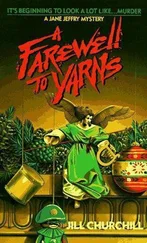It is difficult to find a word to characterize Jakub's relation to Olga. She was the daughter of a friend of his who had been executed when Olga was seven years old. Jakub decided at that time to take the little orphan under his wing. He had no children, and such obligation-free fatherhood appealed to him. He playfully called Olga his ward.
They were now in Olga's room. She plugged in a hotplate and put a small saucepan of water on it, and Jakub realized that he could not bring himself to reveal the purpose of his visit to her. He didn't dare tell her that he had come to say goodbye, was afraid the news
would take on too pathetic a dimension and generate an emotional climate between them that he regarded as uncalled for. He had long suspected her of being secretly in love with him.
Olga took two cups out of the cupboard, spooned instant coffee into them, and poured boiling water. Jakub stirred in a sugar cube and heard Olga say: "Please tell me, Jakub, what kind of man was my father really?" "Why do you ask?"
"Did he really have nothing to blame himself for?"
"What are you thinking of?" asked Jakub, amazed. Olga's father had been officially rehabilitated sometime earlier, and this political figure who had been sentenced to death and executed had been publicly proclaimed innocent. No one doubted his innocence.
"That's not what I mean," said Olga. "I mean just the opposite."
"I don't understand," said Jakub.
"I was wondering if he hadn't done to others exactly what was done to him. There wasn't a grain of difference between him and those who sent him to the gallows. They had the same beliefs, they were the same fanatics. They were convinced that even the slightest differences could put the revolution in mortal danger, and they suspected everyone. They sent him to his death in the name of holy things he himself believed in. Why then couldn't he have behaved toward others the same way they behaved toward him?"
"Time flies terribly fast, and the past is becoming
more and more incomprehensible," said Jakub after a moment's hesitation. "What do you know of your father besides a few letters, a few pages of his diary they kindly returned to you, and a few recollections from his friends?"
But Olga insisted: "Why are you so evasive? I asked you a perfectly clear question. Was my father like the ones who sent him to his death?"
"It's possible," said Jakub with a shrug.
"Then why couldn't he too have been capable of committing the same cruelties?"
"Theoretically," replied Jakub very slowly, "theoretically he was capable of doing to others exactly the same thing they did to him. There isn't a man in this world who isn't capable, with a relatively light heart, of sending a fellow human to his death. At any rate I've never met one. If men one day come to change in this regard, they'll lose a basic human attribute. They'll no longer be men but creatures of another species."
"You people are wonderful!" Olga exclaimed as if shouting at thousands of Jakubs. "When you turn everybody into murderers your own murders stop being crimes and just become an inevitable human attribute."
"Most people move around inside an idyllic circle between their home and their work," said Jakub. "They live in a secure territory beyond good and evil. They're sincerely appalled by the sight of a murderer. But taking them out of this secure territory is enough to make them murderers themselves, without their know-
ing how it happened. There are tests and temptations that only rarely turn up during the course of history. Nobody can resist them. But it's utterly useless to talk about this. What counts for you isn't what your father was theoretically capable of doing, because there's no way of proving it anyway. The only thing that should interest you is what he actually did or didn't do. And in that sense he had a clear conscience."
"Are you absolutely sure?"
"Absolutely. No one knew him better than I did."
"I'm really glad to hear this from you," said Olga. "Because I didn't ask you the question by chance. For a while now I've been getting anonymous letters. They say I'm wrong to play the daughter of a martyr, because my father, before he was executed, himself sent to prison innocent people whose only offense was to have an idea of the world different from his."
"Nonsense," said Jakub.
"These letters describe him as a relentless fanatic and cruel man. Of course they're spiteful anonymous letters, but they're not the letters of a primitive. They're not exaggerated, they're concrete and precise, and I almost ended up believing them."
"It's always the same kind of revenge," said Jakub. "I'm going to tell you something. When they arrested your father, the prisons were full of people the revolution had sent there in the first wave of terror. The prisoners recognized him as a well-known Communist, and at the first chance they pounced on him and beat him unconscious. The guards watched, smiling sadistically."
"I know," said Olga, and Jakub realized he had told her a story she had heard many times. He had long ago resolved never again to talk about these things, but without success. People who have been in an automobile accident cannot help remembering it.
"I know," Olga repeated, "but it doesn't surprise me. The prisoners were jailed without a trial, very often without any grounds. And all of a sudden they were face to face with one of the men they considered responsible!"
"From the moment your father put on the prison uniform, he was a prisoner among prisoners. There was no sense in harming him, especially under the guards' complacent eyes. It was nothing but cowardly revenge. The vilest desire to trample on a defenseless victim. And these letters you got are fruits of the same kind of revenge, which I now see is stronger than time itself."
"But Jakub! Nevertheless a hundred thousand people were put in prison! And thousands never came back! And not a single one of those responsible was ever punished! This desire for revenge is really just an unsatisfied desire for justice!"
"Taking revenge on the father through the daughter has nothing to do with justice. Remember that because of your father you lost your home, you were forced out of your home town, you were denied the right to attend the university. Because of a dead father you barely knew! And because of your father should you be persecuted now? I'm going to tell you the saddest discovery
of my life: the persecuted are no better than the persecutors. I can easily imagine the roles reversed. You might see in this logic the desire to shift your father's responsibility onto the Creator who made man as he is. And maybe it's good for you to see things this way. Because to come to the conclusion that there's no difference between the guilty and the victims is to abandon all hope. And that, my girl, is what is called hell."
Ruzena's two colleagues were burning with impatience. They wanted to know how the previous day's meeting with Klima had gone, but they were on duty at the other end of the thermal building, and it was not until about three o'clock that they could get to their friend and bombard her with questions.
Ruzena hesitated to answer and finally said uncertainly: "He said he loved me and he'd marry me."
"You see! I told you so!" said the thin one. "And is he going to get a divorce?"
"He said yes."
"He'll have to," the fortyish one said cheerfully. "A baby's a baby. And his wife's never had one."
Now Ruzena had to admit the truth: "He said he's going to take me to Prague. He's going to find me a
job there. He said we're going to Italy on vacation. But he doesn't want a child right away. And he's right. The first years are the most beautiful, and if we had a child we wouldn't be able to make the most of each other."
Читать дальше










